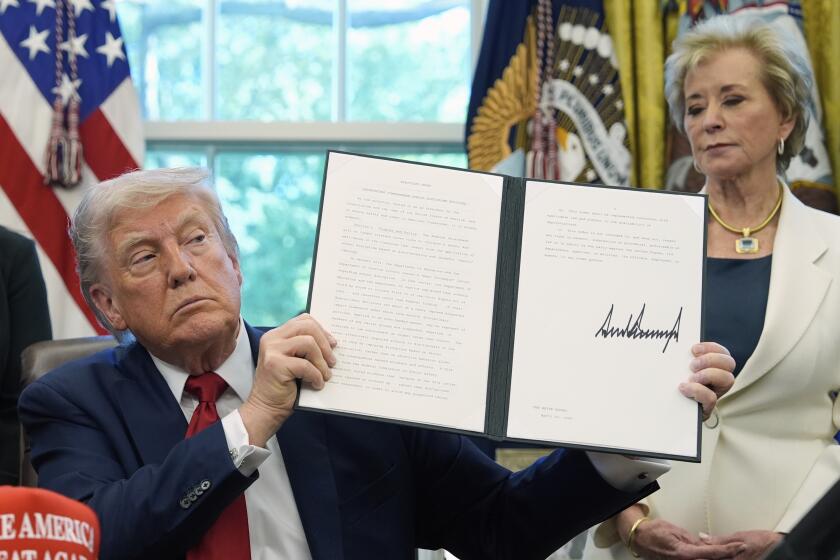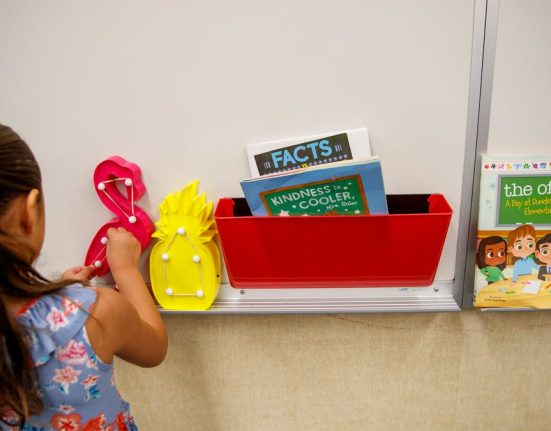The Trump administration on Monday moved to withhold a projected $6.8 billion nationwide in education funds — including at least $811 million from California — money appropriated by Congress to boost teacher training, after-school programs and classroom technology and to help students who are learning English and those who are from migrant families.
Although the frozen funds make up less than 1% of California’s total education budget, they have an outsize cumulative effect. And they involve dollars that already are accounted for in terms of staff hired and programs planned. The disruption would be substantial — and state education leaders, including Supt. of Public Instruction Tony Thurmond, said Monday evening that the problems are unfolding immediately.
“There have been many rumors about the Trump Administration cutting education funding, and now that rumors have become reality, it is worse than we imagined,” Thurmond said in a statement to The Times. “Trump is illegally impounding billions of dollars appropriated by Congress to serve students this fiscal year.”
“This illegal action will harm students starting now,” Thurmond added. “It cannot stand!”
The administration listed the frozen programs by their federal designation: Title III-A, for example, supports students who are learning English. Title I-C helps overcome the learning challenges of the children of migrant workers. Both programs had all their funds withheld.
Read more: California law faces revise as high court allows parents to ‘opt out’ of LGBTQ+ school stories
Word of the federal action began to trickle out to worried school systems Monday afternoon. The notification, in an email from the federal Department of Education, was 84 words in length — and, according to education officials and advocates, included no amplification:
“Given the change in Administrations, the Department is reviewing the FY 2025 funding for the [Title I-C, II-A, III-A, IV-A, IV-B] grant program(s), and decisions have not yet been made concerning submissions and awards for this upcoming academic year,” the email began.
“Accordingly, the Department will not be issuing Grant Award Notifications obligating funds for these programs on July 1 prior to completing that review.”
The notification concluded: “The Department remains committed to ensuring taxpayer resources are spent in accordance with the President’s priorities and the Department’s statutory responsibilities.”
The programs noted in the email make up more than 10% of federal spending on K-12 schools in 33 states, according to the Learning Policy Institute.
The targets of the freeze are not especially surprising — all of the withheld funds are from programs the administration wants to slash or eliminate. And those details — and the justification for them — are clearly spelled out in President Trump’s budget proposal for the next federal fiscal year, which begins in October.
Read more: California violated civil rights of female students by allowing trans athletes to compete, feds say
But the Trump administration is freezing funds that Congress approved for the fiscal year already in progress, which began in October 2024. Because of the way federal, state and local budgets line up, this money was due to reach states Tuesday and to be spent as part of the budget for the school district fiscal year, which begins Tuesday.
School districts — on the expectation they would receive these funds appropriated by Congress — have generally already hired those expected to carry out these programs; many are long-standing efforts.
The Education Department declined to comment late Monday — referring inquiries to the Office of Management and Budget. That office too had no immediate comment.
But the administration already has made clear its rationale for ending these efforts in its budget proposal, which on Monday was inching closer to congressional approval.
“To end overreach from Washington and restore the rightful role of State oversight in education, the Budget proposes to eliminate the misnamed English Language Acquisition program which actually de-emphasizes English primacy by funding [nongovernmental organizations] and States to encourage bilingualism,” the administration stated. “The historically low reading scores for all students mean States and communities need to unite — not divide — classrooms using evidence-based literacy instruction materials to improve outcomes for all students.”
Read more: Revised LAUSD budget saves jobs today, trims future retiree health benefit contributions
Advocates for English learners support “evidence-based literacy instruction,” but take issue with much of the rest of the administration’s assertions, including the claim that programs to help students learning English are divisive.
“We want our students to gain proficiency in English so that they can access their education in English,” said Martha Hernandez, executive director of Californians Together, a coalition of groups that advocates for English learners. “And the majority of English learners are in English-only settings. These funds help students learn English.”
Hernandez said there are about 5 million English learners speaking 100 different languages nationwide — about 1.1 million in California.
The cut to migrant education is justified in budget documents as eliminating “programs that work to the detriment of children’s academic success by encouraging movement from, rather than stability and consistency in, a single location. These programs have not been proven effective, are extremely costly, and encourage ineligible non-citizens to access [services] , stripping resources from American students.”
The migrant program’s effectiveness is open to reasonable debate, but the assertion that it encourages lack of stability is difficult to square with the reality on the ground.
Los Angeles Unified School District uses this funding for academic support to provide stability and academic continuity for these students and their families.
The program in Nebraska describes itself as providing “educational services for migrant children to help reduce obstacles that result from repeated moves across school district boundaries.”
For students ages 3 to 5, the effort includes “promoting interest in learning and filling educational gaps at home to prepare students for Kindergarten” and also “helping families find affordable preschool options.”
The funding freeze has become yet another area of conflict between the Trump administration and local educators, especially in blue states and urban areas. However, this funding pullback, if it stands, also will fall heavily on rural areas and red states.
Trump’s authority to withhold these funds will almost certainly be challenged in court. It is unclear whether it will survive scrutiny within Congress.
Federal law prohibits the executive branch from refusing to distribute congressionally appropriated dollars, although the president can ask Congress for permission to hold back funds. Congress has 45 days after such a request is made to approve the president’s action. Otherwise, the money must be spent as originally intended.
This story originally appeared in Los Angeles Times.







